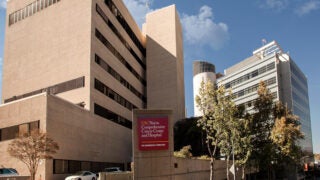Mexican delegation visits USC to discuss cooperative programs
USC will host a leading Mexican artist on campus in the near future
USC President C. L. Max Nikias and Anthony Bailey, vice president for strategic and global initiatives, hosted a senior delegation of officials from Mexico on campus yesterday to discuss USC’s growing relationship with the country. Led by Mexico’s secretary of foreign affairs, Claudia Ruiz Massieu Salinas, the group also included Paulo Carreño King, undersecretary for North America and Carlos García de Alba, consul general of Mexico in Los Angeles.
“We have made a concerted effort to create closer bonds with Mexican institutions and I am thrilled that these efforts are now bearing fruit,” Nikias said. “Whether hosting brilliant Mexican postdoctoral researchers at USC or conducting joint research with leading Mexican universities, there’s little doubt that these kinds of partnerships create broad reaching benefits. I was tremendously pleased to hear Secretary Ruiz Massieu express her support for our efforts as well as her hope that USC can deepen these ties in the years to come.”
“Yesterday’s visit by Secretary Ruiz Massieu and her team serves as testament to the leadership USC has shown in reaching out and forming meaningful alliances with Mexican institutions,” Bailey added. “We discussed a host of potential new areas of alliance that will be explored in detail in the coming months. One immediate step is for USC to participate in a program called Cátedra Cultural, a co-sponsored arts speaker program that will see us host a leading Mexican artist on campus in the near future.”
Other areas identified for potential cooperation include arts and creative industries, medicine, petroleum engineering and urban development.
USC’s bonds with Mexico have been on a steady growth trajectory. The number of degree-seeking students at USC from the country has more than doubled since 2010 while new partnerships with leading Mexican universities including the National Autonomous University of Mexico, Instituto Tecnológico de Monterrey, Instituto Tecnológico Autónomo de México and Iberoamericana University have enriched academic scholarship here at USC and in Mexico.
USC also has in place several landmark partnerships with the Consejo Nacional de Ciencia y Tecnología (CONACYT) — the Mexican equivalent of the National Science Foundation, including an agreement for USC to host postdoctoral fellowships for Mexican scholars to study at USC for up to two years. 11 outstanding researchers were hosted on campus in the past year and for the coming academic cycle, that number is expected to grow.
USC first opened an office in Mexico City in 2005 to foster partnerships, engage alumni and attract prospective students. Following a campus visit by Mexico’s previous foreign secretary, José Antonio Meade Kuribreña in 2014, President Nikias led a delegation of university leaders to the country the following year. Earlier this year, provost Michael Quick led a follow-up trip to Mexico City, where he helped to launch the call for the next cycle of CONACYT-USC-sponsored postdoctoral researchers.
USC’s broad-reaching academic partnerships with Mexican institutions have addressed several important topics including drug abuse in Mexico City, aging and health among Mexico’s senior citizens and poverty alleviation in Yucatan.



